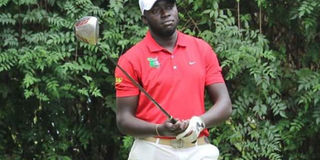‘I’ve been reduced to a beggar:’ Virus spells doom for caddies

John Kamais, a caddie and a member of Nakuru Golf Club, competes in a past tournament at the club. PHOTO | FRANCIS MUREITHI |
What you need to know:
- Kabogoro is one of about 60 caddies at the 18-hole Nakuru Golf Club who earn their daily bread by guiding golfers every weekend and midweek on the course that sits on the slopes of the scenic Menengai Crater.
Clad in a faded polo shirt, 65-year-old Simon Kabogoro is one of the caddies who go to Nakuru Golf Club nearly every day to inquire from the caddie master whether golfers have resumed play.
Kabogoro is one of about 60 caddies at the 18-hole Nakuru Golf Club who earn their daily bread by guiding golfers every weekend and midweek on the course that sits on the slopes of the scenic Menengai Crater.
Kabogoro has been a caddie for 44 years at the 91-year-old uphill course.
He has been caddying, a job he loves and never misses a moment to work in the lush green course.
Kabogoro says that Nakuru Golf Club is like his second home.
“For more than 40 years, I have earned my daily bread here and the closure of the club is a big blow to me. I have now been reduced to a beggar something that I was not used to,” said Kabogoro.
He is not alone. John Kamais is another caddie whose keen interest in the gentleman’s game has seen him and his colleague Gentol Esto earn sponsorship to participate in the Kenya Amateur Golf championship organised by Kenya Golf Union (KGU).
“This year, I was planning to turn professional but sadly Covid-19 disease has disrupted my plans and that now means everything has been put on hold until this pandemic is overcome,” said Kamais, who is a handicap one player.
He added: “Apart from playing golf I was also using my experience in training rookies and every weekend I was earning extra coin that was enough to take care of my family.”
Kamais, 28, started caddying in 2009 and three years later, he started playing golf and is one of the fast-rising youthful golfers and has been registering victories in many tournaments at the club.
However, the arrival of Covid-19 disease has destroyed the livelihoods of the caddies. They are now staring at a bleak future.
Apart from the caddies, at least 26 workers at the club have been sent home on unpaid leave until the pandemic is contained. This is because all the planned tournament at the club have been suspended.
“The closure of the golf club is a big blow to the caddies as a quarter of them have families and this means their source of income has been cut,” John Muiruri, the club’s caddie master," told Nation Sport.
He added: “A number of the caddies have worked at the course for more than 20 years and have never known any other job.”
Some of the oldest caddies who have worked for more than two decades at the club include John Eturo, Stanley Karume and Simon Mureithi.
The club has seven female caddies who also earn their daily bread from caddying.
Many of the caddies are yet to come to terms with the April 7 directive by Health Cabinet Secretary Mutahi Kagwe that all golf clubs and club houses be closed to help contain the spread of the deadly coronavirus.
“The Sh700 golfers pay me every weekend may seem little money but it makes a whole difference in my life as I have been able to feed my family,” said another caddie.
To cushion the caddies against the harsh economic realities, members of Nakuru Golf Club have established a kitty where each member is contributing Sh2,000 per month to buy foodstuff.
The golf club has more than 300 active members. While golfers have been allowed to play and practice without their caddies, it has presented a major challenge even as they strive to observe social distancing rules.
“My caddie is more than a mere porter and an assistant on the golf course. He is guide and friend,” said Nakuru Golf Club chairman Stephen Kihumba.
“This relationship between a golfer and his caddie is one of the most unique in sports, and it can have a direct impact on a player’s success, whether one is participating in a tournament or while on the training trail,” explained Kihumba.
“There is a deep bond between golfers and their caddies and for me, any game of golf or training would not be complete without my favourite caddie,” added Kihumba.
At the same time, Kihumba who is in charge of Junior Golf Foundation in the region, has said that caddies can read a player and know how to communicate. He added that they can understand what the pressure of a situation can do to a golfer’s decision-making process, or how adrenaline can affect the flight of a ball.
“A good caddie can make a good player a little better, and sometimes that’s the difference between lifting a trophy or finishing 12th,” said Kihumba.
Caddies usually make good money for each 18-hole round. The club has set a flat caddying fee per round of Sh700 and between Sh300 and Sh1,000 to train newcomers at the club, and for carrying two bags around 18 holes.
Besides, they also get handsome tips from many philanthropic golfers.
Most caddies are also engaged in the maintenance of the course and are employed on casual basis. Such caddies earn a about Sh30,000 per month.





